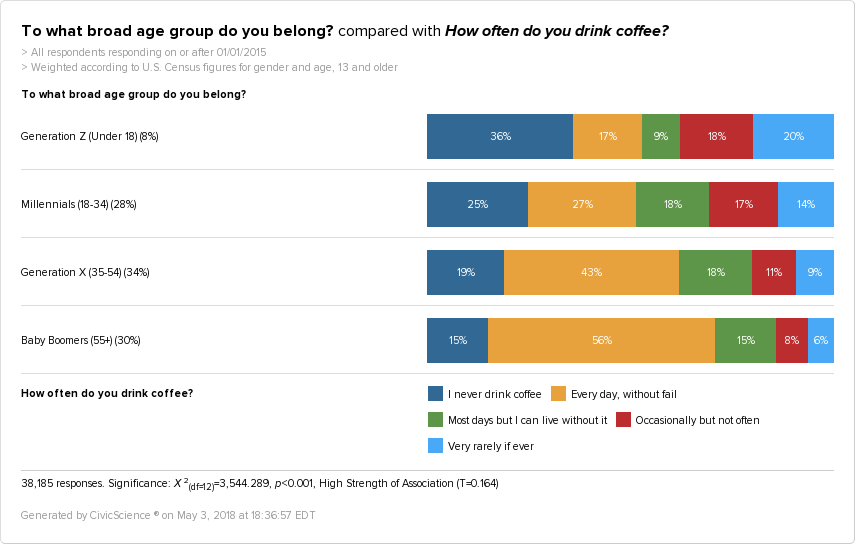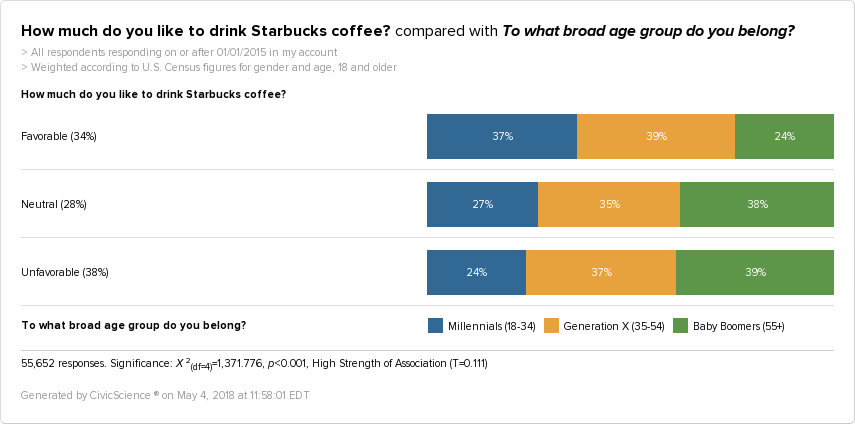The Gist: Coffee consumption may be on the rise, but Millennials are drinking less coffee than older generations and opting for alternative caffeinated beverages.
To brew or not to brew? Recently, California ruled that coffee now must come with a “drink at your own risk” warning label because it contains a compound known to be carcinogenic. But whether its causing cancer or fighting it, the jury is still out on the health effects of coffee.
However, here’s some reassuring news for the multi-billion dollar industry — the possible connection between coffee and cancer doesn’t seem to be slowing down the American public’s consumption of the stuff. (The yellow line = those who drink coffee every day.)
We’ve seen a slight increase in daily coffee drinking since 2015 leading up to today, where about 40% of Americans aged 13+ drink coffee every day, while 16% drink it most days. Among U.S. adults, those numbers are even higher: 43% are everyday drinkers, and 17% are most-days drinkers.
Growth appears to be happening across all generations. However, we can’t ignore a glaring statistic: Millennials surveyed are consuming significantly less coffee than older generations.
Baby Boomers are the most avid coffee drinkers and are more than twice as likely as Millennials to be daily drinkers. Why? Are Millennials more health-conscious than Gen Xers and Baby Boomers?
Some Millennial habits may be healthier than older generations (such as, they get more sleep, smoke less, and eat things like avocado toast), but when it comes to caffeine, Millennials are still guilty. In fact, they are more likely to consume soft drinks and energy drinks when compared to older (and younger) generations:
The caveat, of course, is that we’re not sure how frequently, so the narrative is not yet complete. Also, the crossover with coffee habits isn’t quite clear — how many Millennials are double-fisting Coke or Red Bull and coffee?
If the general public is telling, we can assume that most Millennials drink some form of caffeinated beverage. Looking at the intersection between coffee drinking habits and other caffeinated drink choices among U.S. adults, we see that the majority of irregular or non-coffee drinkers are getting their fix elsewhere, largely with tea and soft drinks.
Millennials and coffee: a volatile combination.
While it may not be the de facto caffeinated swill of choice, the relationship Millennials have to coffee seems to be more volatile than other generations.
For example, between the second and third quarters of 2017, we saw a 5% average rise in daily coffee drinking among U.S. adults; among Millennials alone, that same growth spiked over 10%.
And then, there’s Starbucks. After an incident in a Philadelphia store this April, resulting in two African-American customers being arrested (which we looked at in a past post), the largest drop in favorability for the brand came from Millennials.
Today those numbers have returned to their pre-incident levels (perhaps as the result of Starbucks’ response to initiate employee anti-bias training), where Millennials are the most likely among U.S. adults to say they love the brand, making up 42% of Starbucks lovers and 37% of those who are favorable to the brand overall.
Why would a generation that drinks less coffee be so favorable to Starbucks? Some research suggests that Millennials are more likely to buy prepared coffee drinks from cafes and restaurants, perhaps willing to shell out for the buying ‘experience’.
It’s not surprising that Millennials have a more complicated relationship with coffee than older generations, and Starbucks is definitely part of why. While Baby Boomers may be content to hit the “brew” button on the coffee maker as they’ve done for decades, or maybe even use a Keurig, Millennials came of age during an era of coffee choice that continues to grow. Frappuccinos and lattes or french press and pour-over, natural fair trade or conventional, ‘third-wave’ indie roasters or Dunkin Donuts, cold brew or nitro? Today, the list of options goes on and on.
Like craft beer (which Millennials drink more than older generations), the coffee industry is now as complex and nuanced as the earthy notes you should be tasting in your cup of high-altitude Guatemalan Antigua.













